Coming Home Blu-ray Movie
HomeComing Home Blu-ray Movie 
Kino Lorber | 1978 | 128 min | Rated R | Nov 18, 2014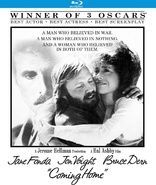
Movie rating
7.4 | / 10 |
Blu-ray rating
| Users | 4.0 | |
| Reviewer | 3.5 | |
| Overall | 3.5 |
Overview
Coming Home (1978)
A woman, whose husband is fighting in Vietnam, falls in love with another man who suffered a paralyzing combat injury there.
Starring: Jane Fonda, Jon Voight, Bruce Dern, Robert Carradine, Penelope MilfordDirector: Hal Ashby
| Drama | Uncertain |
| Romance | Uncertain |
| War | Uncertain |
Specifications
Video
Video codec: MPEG-4 AVC
Video resolution: 1080p
Aspect ratio: 1.85:1
Original aspect ratio: 1.85:1
Audio
English: DTS-HD Master Audio 2.0 Mono
Subtitles
English SDH
Discs
25GB Blu-ray Disc
Single disc (1 BD)
Playback
Region A (locked)
Review
Rating summary
| Movie | 4.0 | |
| Video | 3.5 | |
| Audio | 3.5 | |
| Extras | 4.0 | |
| Overall | 3.5 |
Coming Home Blu-ray Movie Review
Reviewed by Brian Orndorf November 27, 2014Films about post-war life are relatively common these days, openly exploring the mental strain of combat and the demands of civilian life on those who’ve endured hell. However, in the 1970s, such a topic was difficult to approach, especially when discussing the Vietnam War. While not a groundbreaking feature, 1978’s “Coming Home” was a key piece of the Vietnam conversation, striving to provide a look at lives stained by distance, violence, and guilt, using the conventions of a romantic movie to help ease viewers into challenging ideas about a conflict that was only beginning to be dramatized by Hollywood. Directed by Hal Ashby, written by Waldo Salt and Robert C. Jones, and starring Jane Fonda, Jon Voight, and Bruce Dern, “Coming Home” offers incredible talent to bring tension to life, creating a potent look at fresh wounds and broken hearts, sold with unusual sensitivity.
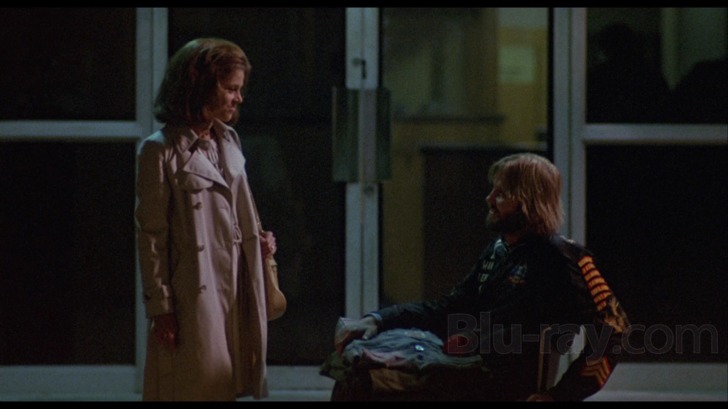
In the late 1960s, Sally (Jane Fonda) watches as her Marine husband, Bob (Bruce Dern), prepares to join the fight in Vietnam. Eager to prove his patriotism and kill the enemy, Bob leaves behind a spouse who doesn’t know what to do with her life, trusting she’ll maintain passivity until he returns home. Befriending Vi (Penelope Milford), another military wife, Sally begins to venture out of her comfort zone, renting an apartment by the beach and pursuing a volunteer position at the local veterans’ hospital. Discovering Luke (Jon Voight) in the facility, Sally is reunited with her old high school classmate, who’s now a paraplegic after a brief stint in Vietnam, growing more hostile by the day as he suffers through humiliations and neglect. Developing a warm chemistry that permits confession and romance, Sally and Luke soon embark on an affair, which effectively complicates their lives as Bob’s fate overseas remains in question.
Emotional sophistication is the engine that drives “Coming Home.” While the effort teases (and periodically indulges) melodrama, the feelings contained within are heartfelt and organic to the situation. Such depth gives the picture an immediate boost in authenticity, with viewers asked to trust the production as it treats the central conflict with a degree of respect. There are no heroes and villains here, just a collection of lost souls looking for comfort in a cold world. Such ostracization is key to grasping the specialized Vietnam War experience presented here. “Coming Home” is not about combat, but life after unspeakable violence, with each of these characters dealing with an aspect of reintegration they’re not prepared to handle. Ashby layers in this theme of the forgotten throughout the movie, even opening with a scene of pool hall debate among vets, some understanding the need to fight, while others have grown resentful, unwilling to trust a country that so callously sent them into an impossible situation, returning them home without the mental and physical tools required to navigate this new frontier.
“Coming Home” is provocative but never lashes out at the viewer. Ashby welcomes tenderness after initial, far itchier introductions are made, looking to build a comfort level between Sally and Luke that eases their union. The screenplay cuts a few corners with Bob, making him a harsh, driven man with little concern for his wife outside of jealousy, but it does the trick, giving Sally a reason to trust Luke with her heart while she struggles with the issue of infidelity. Guilt drills its way into every scene here, extending to Vi, who can’t help her shattered brother (Robert Carradine) after his traumatic experience in Vietnam, and Luke is also carrying a heavy emotional burden, left without the use of his legs as memories of death and destruction haunt him to his core, constantly reminded of his lowly position in the world during his harrowing time in the V.A. hospital. Sally is struck by horrors as well, with her eyes opened to the reality of the conflict by the wounded men she meets during her daily rounds and time with Bob, who gradually exposes his military poisoning to her in disturbing ways.
“Coming Home” is political, but not oppressively so. It’s a pointed look at the changing face of a nation, yet Ashby is careful to preserve the human element, trusting his three leads to sustain a sense of understanding to balance out the anger. Voight and Fonda contribute excellent work, making a credible pair of lonely people while nurturing their spiritual awakening as the floodgates of passion are opened for the first time in a long time. The pair refuses schmaltz, working diligently to capture conversational nuance and authentic chemistry. Dern has showier role, and Ashby is perhaps too permissive with the actor at times, but the finer points of Bob’s breakdown are vividly portrayed, successfully communicating total ruin.
Also defining the “Coming Home” viewing experience is the impressive soundtrack that’s handed wall-to-wall priority, running as musical commentary for these character arcs. With The Rolling Stones, Janis Joplin, Bob Dylan, The Beatles, and Jimi Hendrix (a small selection of the overall pop and folk music symphony) marching their way into the movie, “Coming Home” is immediately placed into a specific era and headspace. It’s a fantastic addition, and quite a remarkable collection of iconic artists that couldn’t be replicated today.
Coming Home Blu-ray Movie, Video Quality 
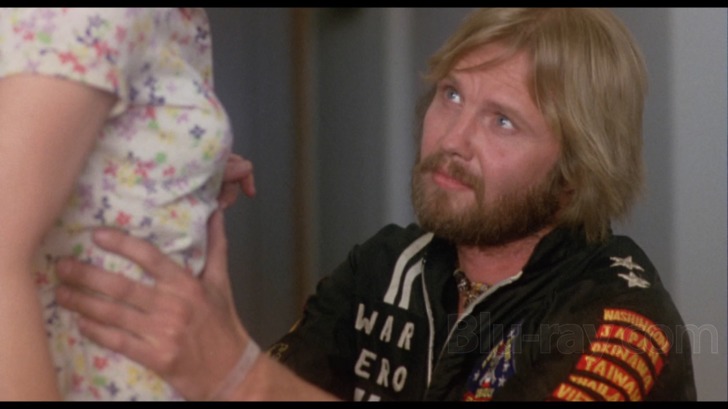
The AVC encoded image (1.85:1 aspect ratio) presentation is a largely consistent viewing experience. Keeping in step with Haskell Wexler's extremely gauzy cinematography, the feature retains intended softness, though some detail does remain, emerging from period costuming and close-ups. Grain is present, offering a filmic appearance, and colors appear natural and contained, capturing the warm California palette and the colder hues found inside the veterans hospital. Deep blacks aren't a priority for the photography, but distances and fabrics remain in view. Moderate debris and speckling are detected, and there's a particularly harsh edit at the 1:52 mark.
Coming Home Blu-ray Movie, Audio Quality 
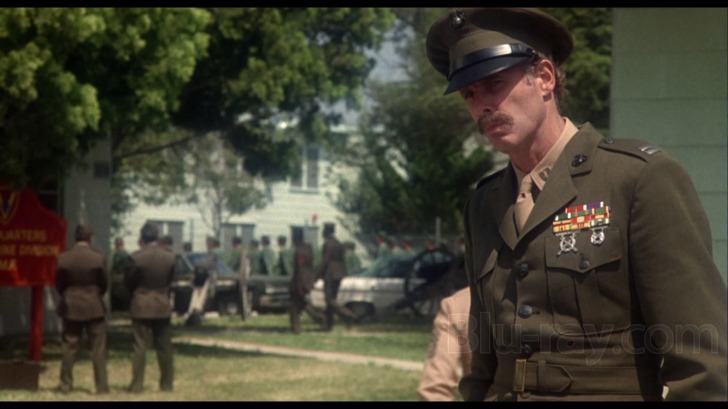
The 2.0 DTS-HD MA sound mix emerges in a surprising manner, keeping its roster of soundtrack cuts balanced with dialogue exchanges. It seems intentional, like a radio in the background that keeps churning out the hits, but rarely is a song allowed a distinct presence. Performances are clean and clear, with dramatic bursts managed satisfactorily. Atmospherics are tame, but there's a sense of background life during hospital visits, and group activity isn't cluttered. While the track is largely free of distortion, there is a loud pop at the 1:57 mark. Thankfully, it's an isolated incident.
Coming Home Blu-ray Movie, Special Features and Extras 
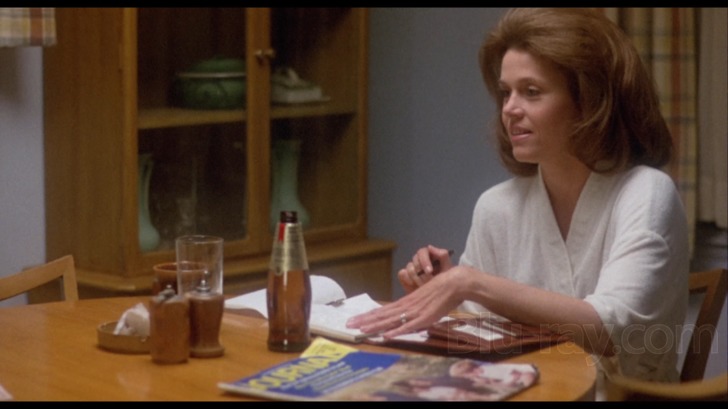
- Commentary features actors Jon Voight and Bruce Dern, and cinematographer Haskell Wexler.
- "Coming Back Home" (24:55, SD) is a 2002 making of that sits down with Voight, Dern, and Wexler to discuss the origins of the movie and their individual perspective on its themes and casting. Sounding very much in awe of the work, the trio is celebratory and reflective, sharing praise for Fonda and especially Ashby. While Dern trips over intentions to be poetic, Voight shares some interesting stories about his method acting, spending weeks in a wheelchair before the shoot to get the feel of his character's daily life.
- "Man Out of Time" (15:24, SD) returns to Voight, Dern, and Wexler, who are joined by Norman Jewison for this Hal Ashby appreciation. Tracking the helmer's career and idiosyncratic ways, the gang is effusive in their praise, telling tales of Ashby's personal touch and desire for true filmmaking independence.
- A Theatrical Trailer (2:03, SD) is included.
Coming Home Blu-ray Movie, Overall Score and Recommendation 
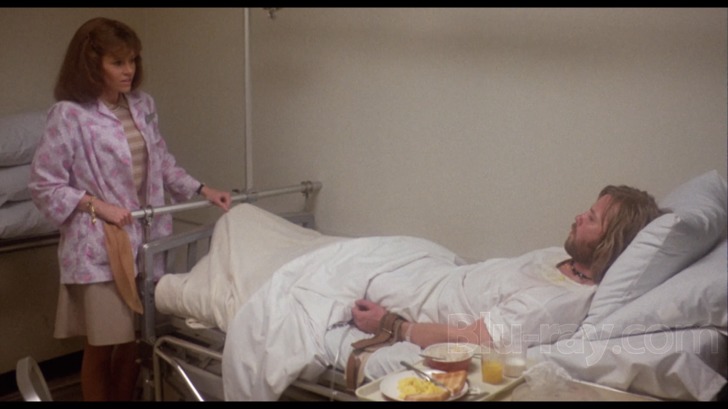
"Coming Home" is powerful and true, sympathetic to the nature of post-war trauma while attempting to understand how it comes to poison the mind (Oliver Stone's "Born on the Fourth of July" is perhaps the definitive story of veteran denial). It's also an effective love story, focusing on characters dealing honestly with their magnetic pull. Ashby puts together quite an impressive collection of urgency, yet, with his special timing and taste, he manages to preserve the intended compassion of the picture, resulting in an effort that hits the head and the heart with equal power.
Similar titles
Similar titles you might also like

Love and Honor
Love & Honor
2013

Wings
1927

Gardens of Stone
1987

The Sand Pebbles
1966

The Messenger
2009

The Deer Hunter 4K
Collector's Edition
1978

Dishonored
1931

J'Accuse
I Accuse
1919

Past Lives
2023

Punishment Park
1971

The Best Years of Our Lives
1946

Dogfight
1991

In the Land of Blood and Honey
2011

The Bitter Tea of General Yen
1933

The Life and Death of Colonel Blimp
1943

September
1987

The Big Parade
Warner Archive Collection
1925

Morocco
1930

The Cranes Are Flying
Летят журавли / Letyat zhuravli
1957

Sunday Bloody Sunday
1971
